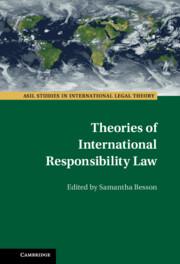Refine search
Actions for selected content:
30 results
9 - Conceptual Instrumentalist Analysis
-
- Book:
- After the Realist Revolution
- Published online:
- 02 May 2025
- Print publication:
- 22 May 2025, pp 97-120
-
- Chapter
- Export citation
8 - Tort Liability and Artificial Intelligence
- from Part II - AI, Law and Policy
-
-
- Book:
- The Cambridge Handbook of the Law, Ethics and Policy of Artificial Intelligence
- Published online:
- 06 February 2025
- Print publication:
- 13 February 2025, pp 158-173
-
- Chapter
-
- You have access
- Open access
- HTML
- Export citation
The international responsibility of a belligerent State in the event of transboundary environmental damage
-
- Journal:
- International Review of the Red Cross / Volume 106 / Issue 925 / April 2024
- Published online by Cambridge University Press:
- 27 September 2024, pp. 469-496
- Print publication:
- April 2024
-
- Article
- Export citation
3 - Enforcing Contribution Claims under National Laws
-
- Book:
- Joint and Several Liability in EU Competition Law
- Published online:
- 15 September 2022
- Print publication:
- 22 September 2022, pp 85-161
-
- Chapter
- Export citation
10 - Causation, Fault and Function in the Rules of Attribution
- from Part III - International Responsibility of Public Institutions: Fault-based or Not?
-
-
- Book:
- Theories of International Responsibility Law
- Published online:
- 01 September 2022
- Print publication:
- 08 September 2022, pp 229-251
-
- Chapter
- Export citation
Theorizing International Responsibility Law, an Introduction
-
-
- Book:
- Theories of International Responsibility Law
- Published online:
- 01 September 2022
- Print publication:
- 08 September 2022, pp 1-24
-
- Chapter
- Export citation
Conclusion
- from Part IV - Responsibility of Public Institutions: A World Tour
-
-
- Book:
- Theories of International Responsibility Law
- Published online:
- 01 September 2022
- Print publication:
- 08 September 2022, pp 336-348
-
- Chapter
- Export citation

Theories of International Responsibility Law
-
- Published online:
- 01 September 2022
- Print publication:
- 08 September 2022
5 - AI and Contract Performance
- from Part II - AI: Contracting and Corporate Law
-
-
- Book:
- The Cambridge Handbook of Artificial Intelligence
- Published online:
- 28 July 2022
- Print publication:
- 11 August 2022, pp 59-73
-
- Chapter
- Export citation
1 - Tort Law and the Society of Individuals
-
- Book:
- Network Responsibility
- Published online:
- 14 July 2022
- Print publication:
- 28 July 2022, pp 29-60
-
- Chapter
- Export citation
8 - State Liability
-
- Book:
- Contemporary French Administrative Law
- Published online:
- 24 February 2022
- Print publication:
- 03 March 2022, pp 233-269
-
- Chapter
-
- You have access
- Open access
- HTML
- Export citation
1 - The Foundations of Due Diligence in International Law
-
- Book:
- Due Diligence Obligations in International Law
- Published online:
- 24 February 2022
- Print publication:
- 03 March 2022, pp 17-63
-
- Chapter
- Export citation
3 - The Scope and Content of Due Diligence Obligations
-
- Book:
- Due Diligence Obligations in International Law
- Published online:
- 24 February 2022
- Print publication:
- 03 March 2022, pp 131-186
-
- Chapter
- Export citation
TORT LAW AND THE MORAL LAW: ANGLO-FRENCH DIVERGENCES
-
- Journal:
- The Cambridge Law Journal / Volume 80 / Issue S1 / September 2021
- Published online by Cambridge University Press:
- 06 October 2021, pp. S33-S60
- Print publication:
- September 2021
-
- Article
- Export citation
9 - The Fundamental Misconception in the Drafting of the Thai Civil and Commercial Code of 1925
- from Part II - Foreign Influence and the Reform Period
-
-
- Book:
- Thai Legal History
- Published online:
- 28 May 2021
- Print publication:
- 17 June 2021, pp 122-137
-
- Chapter
- Export citation
11 - Environmental Crimes
-
- Book:
- Chinese Environmental Law
- Published online:
- 16 June 2021
- Print publication:
- 17 June 2021, pp 360-391
-
- Chapter
- Export citation
7 - The Outer Limits of Culpability
- from Part III - Illustration through Application
-
- Book:
- Justice in Extreme Cases
- Published online:
- 17 December 2020
- Print publication:
- 17 December 2020, pp 177-193
-
- Chapter
- Export citation
7 - How Should They Be Held Accountable?
- from Part II - Benchmark of Accountability
-
- Book:
- Measuring Accountability in Public Governance Regimes
- Published online:
- 28 September 2020
- Print publication:
- 01 October 2020, pp 105-116
-
- Chapter
- Export citation
2 - The Evolution of State Responsibility
-
- Book:
- State Responsibility in the International Legal Order
- Published online:
- 08 October 2020
- Print publication:
- 24 September 2020, pp 53-107
-
- Chapter
- Export citation
7 - Maimonides’ Standard of Care:
-
- Book:
- Maimonides and Contemporary Tort Theory
- Published online:
- 10 August 2020
- Print publication:
- 06 August 2020, pp 310-337
-
- Chapter
- Export citation
